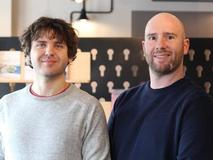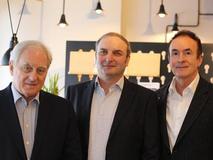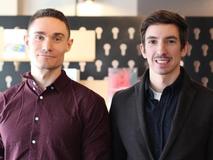CHF 10,000 for a microfluidic technology to perform immunoassays, a solution for DNA sequencing in anti-counterfeiting use, a new paradigm in biological drug formulation, a novel CO2 capture system, and a platform to enhance diabetes self-management
25.01.2023
naialabs, NanoDecoder, Palto Therapeutics, SEPARATIC and Sestante Analytics win Venture Kick's first stage of financial and entrepreneurial support. Their projects use microfluidic technology to perform immunoassays allowing them to measure antibody or protein biomarkers using only nanoliters of samples, with high throughput, high automation, and with low reagent consumption; allow DNA/RNA detection within minutes, and protein detection in hours at a single-molecular level; develop an innovative concept that integrates all necessary functions to overcome small RNA delivery and targeting problems; develop a novel membrane design where adsorbent material is incorporated into the membrane fro the CO2 capture, and allow the user to quickly form an impression of the factors influencing their glucose, explain the underlying pattern, facilitate decision-making, and monitor clinical outcomes.
 |
 naialabs: Left, COO Evan Olson - Right, CEO Grégoire Michielin – Not in the picture, CTO Hon Ming Yip
|
 NanoDecoder co-founder & CEO Dr. Sailan Shui
|
 Palto Therapeutics founders, from left to right, Dr. William Wishart: President, Expert in siRNA Biology; Dr. Helmut Sparrer: CSO Expert in Biochemistry/Immunology; and Dr. Marcel Blommers: Expert in Structural Biology of RNA
|
 SEPARATIC Founder Dr. Timur Ashirov
|
 Sestante Analytics co-founders CSO Sam Scott, and CEO Federico Fontana
|
naialabs: A single drop of blood from home, multiple tests at naialabs
The difficulty of testing different blood biomarkers directly from home represents an important unmet medical need for many. Patients suffering from cancer, or chronic diseases, or receiving biological therapeutic treatments require repeated blood assessments that are inconvenient and time-consuming when performed on-site in a clinic or hospital. Public health researchers monitoring infectious and non-communicable diseases seek testing methods with a low burden for both the study participants and research teams. Finally, many individuals want to monitor their personal health and wellness with a comprehensive, convenient, and affordable method.
Requiring only a few nanoliters of sample per assay, naialabs’ microfluidic technology allows multiple immunoassay tests to be performed using a single drop of blood that is collected at home using existing microsampling devices, sent by regular mail, and tested in their laboratory. Leveraging the unique capabilities of their microfluidic platform, they aim to simplify population-based academic and pharmaceutical research, address market opportunities in testing biomarkers for health assessment, and facilitate the diagnosis of both infectious and non-communicable diseases. The team is composed of Grégoire Michielin, MD-PhD (CEO), Evan Olson, Ph.D. (COO), and Hon-Ming Yip, Ph.D. (CTO). They are advised and hosted by Dr. Gaspard Pardon in the EPFL Bioengineering and Technology platform and supported by the EPFL Startup Launchpad.
The Venture Kick funds will be allocated to the development of their MVP, visual identity, and communication material, as well as for business development. naialabs.com
NanoDecoder: Simple and fast solution for DNA sequencing in anti-counterfeiting use
Counterfeiting accounted for 2.5% of world trade of which 18% for the textile industry (~ USD 500 billion in 2020). The global anti-counterfeiting market is expected to generate revenue of USD 208.71 Billion by the end of 2026. Effective anti-counterfeiting methods are always searched, and DNA tagging is considered the most secure approach. However, the lack of portable devices and slow speed for DNA detection hamper the efficiency and applicability of this anti-counterfeiting method.
NanoDecoder develops nanopore technology-based devices for detecting various molecules, including DNA, and provides fast, cheap, ultra-sensitive results for anti-counterfeiting use. Dr. Sailan Shui is a co-founder, and CEO who graduated from EPFL in 2022, and works on business & product development. Dr. Chan Cao, co-founder, and CTO is a PI at EPFL and works on technology development. Current DNA sequencing takes 3-5 working days which causes huge financial loss in fields requiring in-time, on-site molecular detections, in contrast, NanoDecoder's devices allow DNA detection within minutes. In addition, our devices can also be used for other applications in detecting DNA, RNA, or proteins for food safety checks, or disease diagnostics. NanoDecoder has a total addressable market of CHF 132 billion (TAM) in 2022, and the serviceable obtainable market (SOM) amounts to CHF 924 million for a focus on Europe and Asia Pacific area considering the competition.
With the support of Venture Kick Stage I funds, they invest in the product, business model analysis, and market analysis. nanodecoder.com
Palto Therapeutics: A new paradigm in biological drug formulation
Many therapeutically valuable molecules do have the potency and specificity to act as drugs in incurable diseases, but they cannot reach the diseased cells due to pharmacologic limitations. Genetic drugs like siRNAs are the prototype of a class with extremely high potential whose delivery problem has not been solved. Similar restrictions exist for therapeutic peptides or other macromolecules, like mRNA for vaccination. Their project is to provide a precise solution for targeting such molecules in diseased, but not healthy cells. Guided nano delivery will also limit cost and toxicity problems.
Palto Therapeutics is a new Swiss company founded by Dr. William Wishart, Dr. Marcel Blommers, and Dr. Helmut Sparrer, research scientists with an extensive background in pharmaceutical research. They have a concrete plan for collaboration with Prof Johannes Mosbacher (in vitro biology, PK/PD) and Prof Georg Lipps (engineering of siRNA vehicle), at FHNW/Muttenz, and Dr. Roger Benoit, structural biology, at PSI/Villigen. Prof W. Filipowicz, a pioneer in siRNA research at the FMI, is supporting as an academic advisor. Palto Therapeutics has developed an innovative concept that integrates all necessary functions to overcome small RNA delivery and targeting problems. They have designed a nano-structure called SmartCoat that physically protects the siRNA against degradation and tissue adsorption, has excellent antibody-like pharmacokinetic properties, and allows targeted delivery to cell types and organs of choice. The nanostructure is small (6 nM) and forms a defined 1:1 complex. At the same time, it is non-immunogenic, degradable, and binds to any siRNA sequence without modification. Currently, Palto Tx is focussing to develop solutions for siRNA delivery into tumors for a breakthrough in cancer therapy. The global RNA-based therapeutics market generated almost USD 5 billion in 2021 and is projected to reach over USD 25 billion by 2030, growing at a CAGR of 17.6% from 2021 to 2030.
The Venture Kick funds will be used to support the work with reagents and to finance in-vivo pharmacokinetic (PK) studies. paltotx.com
SEPARATIC: a novel CO2 capture system direct from the air
The CO2 levels in the atmosphere require massive reductions in current emissions as well as capturing of CO2 that has already been released. Current existing technologies either have high installation costs and/or require enormous energy to operate making them not widely applicable. Companies and countries are exceeding their carbon limit and often have to invest in carbon capture technologies as a penalty. However, there is no feasible solution that can be applied in the long term. There is an urgent need for systems that can remove CO2 from air and emissions sources effectively and cheaply.
SEPARATIC's team is composed of founder and team leader Timur Ashirov, Ph.D., founder Prof. Ali Coskun, financial analyst, market research and customer relations Vincent Racciatti, MSc., and tech development Olivier Graber, MSE. Together, they have developed a novel membrane design where adsorbent material is incorporated into the membrane. One of the gases in the mixture will interact with an adsorbent and stick to it while the other one(s) will pass through. This design can be used for direct capture of CO2 from the air. They already tested this concept on the lab scale and have obtained initial successful results. The idea is to put these membranes in a module in series and run air through. CO2 in the air will stick to the adsorbent material while N2 and O2 will pass freely. After capacity has been reached, the CO2 can be released back by simple heating under a vacuum and membranes can be reused again. Moreover, captured CO2 can possess an additional value as it will have high purity and can be sold/reused. Current capture technologies are based on adsorbents and require pressurization and huge investment costs for the building of a plant. Other systems that can also capture CO2 from the air such as Climeworks' ones. These are massive and require also multiple steps in the process by using massive amounts of energy. SEPARATIC's USP is that their systems are mobile, without a required plant. They can capture selectively CO2 (high purity), units are reusable, and their tech does not require advanced assembling and maintenance.
The Venture Kick funds will be used for the prototyping of the membrane units. Initially, the membrane unit will be designed to accommodate 20-50 units that are arranged in series, then, it will be fabricated and put to a test in terms of stability, operational lifetime, operational costs, and capture capacity.
Sestante Analytics: enhance-d, a platform to enhance diabetes self-management
Advances in CGM provide the opportunity to improve glycemic control through improved decision-making. However, patients are disengaged from the current way that this data is presented and the clinical support system is either ineffective or not sufficient to sustain the growing number of patients. Consequently, rates of acute and chronic complications are rising. The current landscape of diabetes digital technology is too focused on the oversimplification of diabetes data. Hence, a common platform to link patients with clinicians is needed.
Sestante Analytics creates a frictionless digital ecosystem that improves understanding of continuous glucose monitoring (CGM), insulin data, exercise, and nutritional data for people with or at risk of diabetes. The founding team (Federico Fontana CEO, Sam Scott CSO, Fabio Saviozzi CCO, and Felipe Maturana CTO) has experience in business development, data science, SaaS and App business development, diabetes technology, digital product development, as well as applied and clinical research in diabetes. Their standard reference platform will assist in the diagnosis, treatment, and assessment of clinical outcomes. This allows the user to quickly form an impression of the factors influencing their glucose, explain the underlying pattern, facilitate decision-making, and monitor clinical outcomes. Educational material integrated within their product will teach patients and clinicians how to better interpret diabetes data. Finally, their product offers unique opportunities as a research tool, utilizing CGM data to evaluate the clinical efficacy of new pharmacologic agents or behavior changes. Of the 1 billion people with diabetes or pre-diabetes today, approximately 7 million are using CGM globally. Considering geographical reach, education level, income, and current and projected adoption of technology (insulin pumps, smart pens), the team estimates a SAM of 5 million individuals with a SOM of 20% in 5 years, on a segment that represents the 0.1% of the total addressable market.
The Venture Kick funds will be used to cover operational expenses related to the development of the MVP of their product. enhance-d.com
The difficulty of testing different blood biomarkers directly from home represents an important unmet medical need for many. Patients suffering from cancer, or chronic diseases, or receiving biological therapeutic treatments require repeated blood assessments that are inconvenient and time-consuming when performed on-site in a clinic or hospital. Public health researchers monitoring infectious and non-communicable diseases seek testing methods with a low burden for both the study participants and research teams. Finally, many individuals want to monitor their personal health and wellness with a comprehensive, convenient, and affordable method.
Requiring only a few nanoliters of sample per assay, naialabs’ microfluidic technology allows multiple immunoassay tests to be performed using a single drop of blood that is collected at home using existing microsampling devices, sent by regular mail, and tested in their laboratory. Leveraging the unique capabilities of their microfluidic platform, they aim to simplify population-based academic and pharmaceutical research, address market opportunities in testing biomarkers for health assessment, and facilitate the diagnosis of both infectious and non-communicable diseases. The team is composed of Grégoire Michielin, MD-PhD (CEO), Evan Olson, Ph.D. (COO), and Hon-Ming Yip, Ph.D. (CTO). They are advised and hosted by Dr. Gaspard Pardon in the EPFL Bioengineering and Technology platform and supported by the EPFL Startup Launchpad.
The Venture Kick funds will be allocated to the development of their MVP, visual identity, and communication material, as well as for business development. naialabs.com
NanoDecoder: Simple and fast solution for DNA sequencing in anti-counterfeiting use
Counterfeiting accounted for 2.5% of world trade of which 18% for the textile industry (~ USD 500 billion in 2020). The global anti-counterfeiting market is expected to generate revenue of USD 208.71 Billion by the end of 2026. Effective anti-counterfeiting methods are always searched, and DNA tagging is considered the most secure approach. However, the lack of portable devices and slow speed for DNA detection hamper the efficiency and applicability of this anti-counterfeiting method.
NanoDecoder develops nanopore technology-based devices for detecting various molecules, including DNA, and provides fast, cheap, ultra-sensitive results for anti-counterfeiting use. Dr. Sailan Shui is a co-founder, and CEO who graduated from EPFL in 2022, and works on business & product development. Dr. Chan Cao, co-founder, and CTO is a PI at EPFL and works on technology development. Current DNA sequencing takes 3-5 working days which causes huge financial loss in fields requiring in-time, on-site molecular detections, in contrast, NanoDecoder's devices allow DNA detection within minutes. In addition, our devices can also be used for other applications in detecting DNA, RNA, or proteins for food safety checks, or disease diagnostics. NanoDecoder has a total addressable market of CHF 132 billion (TAM) in 2022, and the serviceable obtainable market (SOM) amounts to CHF 924 million for a focus on Europe and Asia Pacific area considering the competition.
With the support of Venture Kick Stage I funds, they invest in the product, business model analysis, and market analysis. nanodecoder.com
Palto Therapeutics: A new paradigm in biological drug formulation
Many therapeutically valuable molecules do have the potency and specificity to act as drugs in incurable diseases, but they cannot reach the diseased cells due to pharmacologic limitations. Genetic drugs like siRNAs are the prototype of a class with extremely high potential whose delivery problem has not been solved. Similar restrictions exist for therapeutic peptides or other macromolecules, like mRNA for vaccination. Their project is to provide a precise solution for targeting such molecules in diseased, but not healthy cells. Guided nano delivery will also limit cost and toxicity problems.
Palto Therapeutics is a new Swiss company founded by Dr. William Wishart, Dr. Marcel Blommers, and Dr. Helmut Sparrer, research scientists with an extensive background in pharmaceutical research. They have a concrete plan for collaboration with Prof Johannes Mosbacher (in vitro biology, PK/PD) and Prof Georg Lipps (engineering of siRNA vehicle), at FHNW/Muttenz, and Dr. Roger Benoit, structural biology, at PSI/Villigen. Prof W. Filipowicz, a pioneer in siRNA research at the FMI, is supporting as an academic advisor. Palto Therapeutics has developed an innovative concept that integrates all necessary functions to overcome small RNA delivery and targeting problems. They have designed a nano-structure called SmartCoat that physically protects the siRNA against degradation and tissue adsorption, has excellent antibody-like pharmacokinetic properties, and allows targeted delivery to cell types and organs of choice. The nanostructure is small (6 nM) and forms a defined 1:1 complex. At the same time, it is non-immunogenic, degradable, and binds to any siRNA sequence without modification. Currently, Palto Tx is focussing to develop solutions for siRNA delivery into tumors for a breakthrough in cancer therapy. The global RNA-based therapeutics market generated almost USD 5 billion in 2021 and is projected to reach over USD 25 billion by 2030, growing at a CAGR of 17.6% from 2021 to 2030.
The Venture Kick funds will be used to support the work with reagents and to finance in-vivo pharmacokinetic (PK) studies. paltotx.com
SEPARATIC: a novel CO2 capture system direct from the air
The CO2 levels in the atmosphere require massive reductions in current emissions as well as capturing of CO2 that has already been released. Current existing technologies either have high installation costs and/or require enormous energy to operate making them not widely applicable. Companies and countries are exceeding their carbon limit and often have to invest in carbon capture technologies as a penalty. However, there is no feasible solution that can be applied in the long term. There is an urgent need for systems that can remove CO2 from air and emissions sources effectively and cheaply.
SEPARATIC's team is composed of founder and team leader Timur Ashirov, Ph.D., founder Prof. Ali Coskun, financial analyst, market research and customer relations Vincent Racciatti, MSc., and tech development Olivier Graber, MSE. Together, they have developed a novel membrane design where adsorbent material is incorporated into the membrane. One of the gases in the mixture will interact with an adsorbent and stick to it while the other one(s) will pass through. This design can be used for direct capture of CO2 from the air. They already tested this concept on the lab scale and have obtained initial successful results. The idea is to put these membranes in a module in series and run air through. CO2 in the air will stick to the adsorbent material while N2 and O2 will pass freely. After capacity has been reached, the CO2 can be released back by simple heating under a vacuum and membranes can be reused again. Moreover, captured CO2 can possess an additional value as it will have high purity and can be sold/reused. Current capture technologies are based on adsorbents and require pressurization and huge investment costs for the building of a plant. Other systems that can also capture CO2 from the air such as Climeworks' ones. These are massive and require also multiple steps in the process by using massive amounts of energy. SEPARATIC's USP is that their systems are mobile, without a required plant. They can capture selectively CO2 (high purity), units are reusable, and their tech does not require advanced assembling and maintenance.
The Venture Kick funds will be used for the prototyping of the membrane units. Initially, the membrane unit will be designed to accommodate 20-50 units that are arranged in series, then, it will be fabricated and put to a test in terms of stability, operational lifetime, operational costs, and capture capacity.
Sestante Analytics: enhance-d, a platform to enhance diabetes self-management
Advances in CGM provide the opportunity to improve glycemic control through improved decision-making. However, patients are disengaged from the current way that this data is presented and the clinical support system is either ineffective or not sufficient to sustain the growing number of patients. Consequently, rates of acute and chronic complications are rising. The current landscape of diabetes digital technology is too focused on the oversimplification of diabetes data. Hence, a common platform to link patients with clinicians is needed.
Sestante Analytics creates a frictionless digital ecosystem that improves understanding of continuous glucose monitoring (CGM), insulin data, exercise, and nutritional data for people with or at risk of diabetes. The founding team (Federico Fontana CEO, Sam Scott CSO, Fabio Saviozzi CCO, and Felipe Maturana CTO) has experience in business development, data science, SaaS and App business development, diabetes technology, digital product development, as well as applied and clinical research in diabetes. Their standard reference platform will assist in the diagnosis, treatment, and assessment of clinical outcomes. This allows the user to quickly form an impression of the factors influencing their glucose, explain the underlying pattern, facilitate decision-making, and monitor clinical outcomes. Educational material integrated within their product will teach patients and clinicians how to better interpret diabetes data. Finally, their product offers unique opportunities as a research tool, utilizing CGM data to evaluate the clinical efficacy of new pharmacologic agents or behavior changes. Of the 1 billion people with diabetes or pre-diabetes today, approximately 7 million are using CGM globally. Considering geographical reach, education level, income, and current and projected adoption of technology (insulin pumps, smart pens), the team estimates a SAM of 5 million individuals with a SOM of 20% in 5 years, on a segment that represents the 0.1% of the total addressable market.
The Venture Kick funds will be used to cover operational expenses related to the development of the MVP of their product. enhance-d.com


